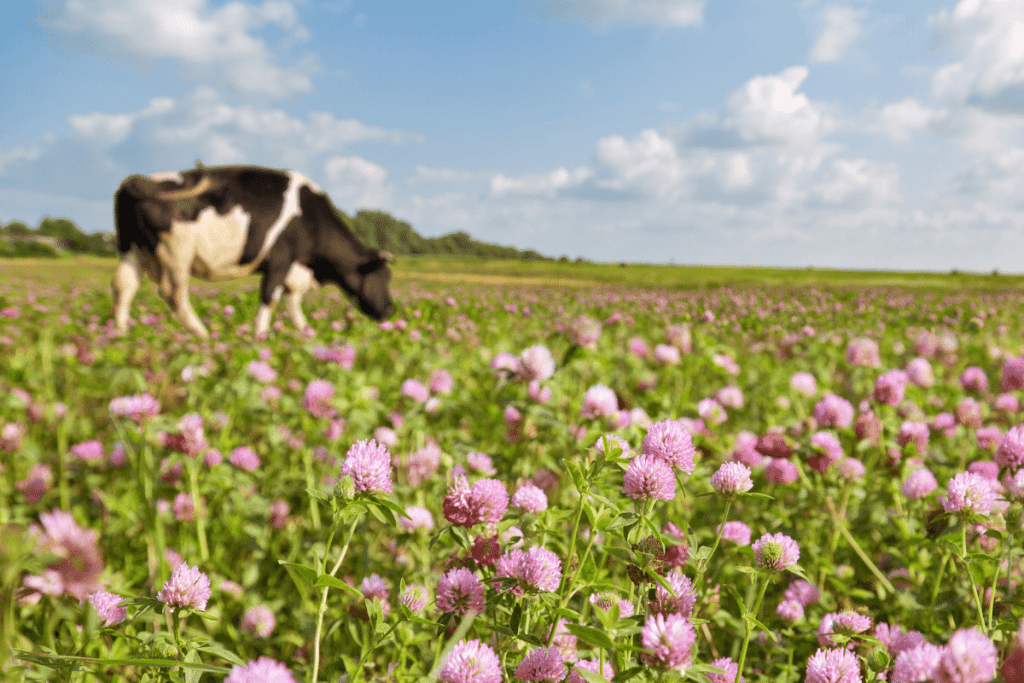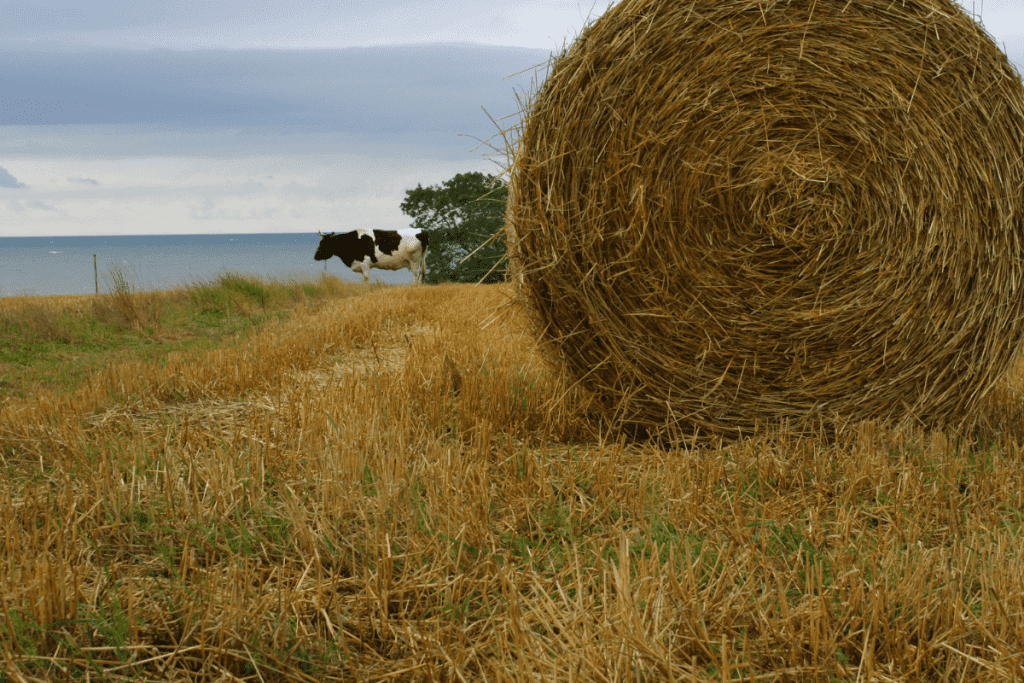Your cow’s diet is vital for their health, and it is essential to make sure what they’re eating is safe for consumption.
This is why it was so surprising to me and others when there were some highly publicized cases of cows dying from eating clover.
Is clover bad for cows?
Like you, I wanted to find out the truth, so I researched, and here’s what I found.
Clover is sometimes dangerous for cows, causing death in high amounts. Mold in clover causes bloat on top of its natural dicoumarol, a gas-inducing chemical. Cattle will develop bloat from overeating fresh clover or moldy clover. This is often fatal if not treated.
In this article, you’ll learn whether clover is bad for cows, what other plants may be toxic to cows, and all about what cattle bloat is and how to handle it.
We’ll also cover the basics of digestion in cows and methods of preventing them from eating too much clover.

Table of Contents
ToggleWhen Is Clover Bad for Cows?
Legumes like clover are an important part of a healthy cow diet. Including legumes in a cow’s diet can increase weight gain and milk production because they are easy to eat.
Cows like to eat legumes because they break down easily and have a sweet flavor.
They are easy to find in most pastures, meaning cows can find them almost anywhere they are grazing.
However, some clovers, including red clover, white clover, and sweet clover (also known as yellow clover), are legumes that can cause pasture bloat.
Pasture bloat is a dangerous condition where gas builds up in the rumen, the cow’s first stomach, and cannot escape.
This can lead to pressure on the breathing passages of the cow and eventually cause death if the pressure is not relieved.
In large amounts, fresh clover of these types can cause bloat.
Because the clover breaks down easily into small particles in the rumen, it causes gas buildup.
Clover is also very high in protein, as opposed to other feeds like corn or oats, which raises the levels of bacteria in the rumen.
Because bacteria drive fermentation in the rumen, the more bacteria there are, the more fermentation occurs.
And with more fermentation comes an increase in the presence of gas in the rumen, leading to bloat.
In addition to the concerns about fresh clover of all types, sweet clover specifically is both high in moisture and contains a chemical called coumarin.
Because the clover is high in moisture and has thick stems good at retaining water, hay containing sweet clover can often become moldy.
When coumarin is exposed to mold caused by improper hay drying, it is converted into dicoumarol, a dangerous chemical for cows.
When a cow consumes moldy sweet clover hay, the dicoumarol enters its body.
Dicoumarol limits vitamin K production, which prevents the cow’s blood from clotting.
This can make cows very sick, with symptoms like:
- Anemia
- Increased heart rate
- Hemorrhage
- Stillbirth in the case of pregnant cows.
This is called sweet clover poisoning.
What is Frothy Bloat in Cattle, and What Causes It?
Frothy bloat is a phenomenon in which the cow’s rumen fills with foam, which then collects gas in the stomach.
Because the cow’s food ferments in their stomachs, huge amounts of gases are released.
When the cow cannot release the pressure of the gas by eructation or “chewing their cud,” as usual, it can apply pressure on their airways.
This can make it impossible to breathe, leading to death by suffocation.
Frothy bloat is often caused by high rates of legume consumption in cattle.
When cows eat plants like alfalfa, several types of clover or winter wheat, the high-protein content of these plants causes higher levels of bacteria and gas in the rumen.
In addition, because these plants are lower in fiber, they break into very small particles in the rumen, creating many gas bubbles and making it difficult for the cows to expel gas by eructation.
Are There Other Plants Toxic to Cattle?
There are several types of plants toxic to cattle, and it is important to make sure your pastures do not contain these plants.
Learning to identify and remove poisonous plants from your pastures is essential.
There are many different types of plants with nitrate contents, which are poisonous to cows.
Because nitrates are concentrated in the stalks and leaves of plants, hay is the greatest concern in this case.
Even plants commonly fed to cows in the hay, such as alfalfa or wheat, may contain high levels of nitrates leading to poisoning.
Sweet clover, oats, corn, and rye are other common plants containing dangerous nitrate levels and are often found in hay.
There are also many plants causing liver damage in cows because they contain a toxin called Pyrrolizidine Alkaloid.
These plants include:
- Ragwort
- Groundsel
- Rattlebox
- Comfrey
As mentioned above, such plants are often found in hay fed to cattle.
Here are some truly poisonous plants with the ability to poison cows:
- Poison Hemlock
- Black Nightshade
- Milkweed
- Death Camas
- Larkspurs
- Lupines
Symptoms of poisoning in cows include difficulty breathing or fast breathing, convulsions, tremors, colic, staggering, stiffness, or lack of appetite.
If you see these symptoms in your cattle, please call your veterinarian immediately for help.
How Do You Prevent the Dangers of Clover?

One significant way to limit clover consumption is never letting your cattle into the pasture on a freshly mowed field.
When you mow a field close to the ground, it makes the low-lying clover more readily available to the cows because you remove the taller grasses they might eat instead.
Another way to limit the dangers of clover is to keep your pastures relatively dry without irrigation.
Watering your pastures regularly can make clover grow faster and make up a greater percentage of the total plants found in your pasture.
To reduce clover levels in your pastures, avoid watering them.
It is also possible to protect your cows by not immediately putting them out to pasture in the morning when there is dew on the ground or when it is raining.
It is also important to supplement fresh grazing with dry, mold-free hay, high in fiber content.
Mold formation happens quicker than you’d expect and is another major cause of cattle deaths due to bloat.
Additionally, you need to allow your cows to graze consistently rather than regularly remove them from their pasture.
If your cows are allowed to graze without being interrupted, their digestive systems will be in constant motion, meaning gases are released on a more consistent basis.
This can reduce the risk of bloat.
What Should You Do if Your Cows Have Bloat?
It is essential to call your veterinarian or livestock specialist as soon as you notice the signs of bloat, which include:
- Distension of the abdomen on the left side
- Signs of pain
- Loss of appetite
- Frequent urination
- Vomiting
Take action right away to lower the risk to cattle in your care.
Your veterinarian may insert a stomach tube into your cow’s esophagus to release pressure within the rumen.
They may also insert a defoaming material into your cow’s rumen to reduce gas bubbles and pressure on the airways.
To prevent bloat, it is a good idea to use anti-bloat treatment on your pastures or in the cow’s trough.
This is best done when clover is growing in full force, especially in the early spring when taller grasses are less available to your cows.
It is also an option to use Bloat Guard blocks in your pasture.
These are salt-molasses blocks with Poloxalene, a chemical that reduces surface tension and prevents gas bubbles from forming in the cow’s rumen.
What Should You Do if Your Cows Have Sweet Clover Poisoning?
It is crucial to call your veterinarian if you suspect your cow has sweet clover poisoning.
Signs of sweet clover poisoning include hemorrhage, stiffness, and blood clots which form small bumps all over the body.
Your veterinarian may perform a blood transfusion from a healthy animal to give the poisoned one new, healthy blood.
This helps a cow’s blood to clot properly and displaces the effects of severe blood loss.
They may also administer vitamin K to counteract the effects of dicoumarol on vitamin K production.
It is possible to prevent sweet clover poisoning preemptively by ensuring the hay you feed your cows is high quality and has been dried properly to prevent molding.
Hay harvested early in the growing season will contain less mature sweet clover, which has thinner stems, meaning it will dry easier, so this hay is safer for cows.
Hay in smaller square bales rather than large round ones is also safer because the hay in small bales is better exposed to the air for drying.
Additionally, hay harvested on dry days and not allowed to be rained on is much less likely to mold.
Another option is to buy baleage rather than hay.
Baleage is bale silage wrapped in plastic immediately after harvested and not opened until the winter months when cold prevents molding.
How useful was this post?
Click on a star to rate it!
We are sorry that this post was not useful for you!
Let us improve this post!
Tell us how we can improve this post?
